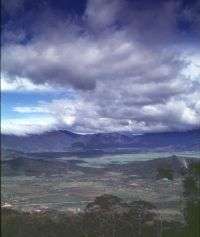Ekari language
| Ekari | |
|---|---|
| Mee | |
| Native to | Indonesia |
| Region | Papua |
| Ethnicity | Ekari |
Native speakers | (100,000 cited 1985)[1] |
| Language codes | |
| ISO 639-3 |
ekg |
| Glottolog |
ekar1243[2] |

Ekari (also Ekagi, Kapauku, Mee) is a Trans–New Guinea language spoken by about 100,000 people in the Paniai lakes region of the Indonesian province of Papua, including the villages of Enaratoli, Mapia and Moanemani. This makes it the second-most populous Papuan language in Indonesian New Guinea after Western Dani. Language use is vigorous. Documentation is quite limited.
External links
Materials on Ekari are included in the open access Arthur Capell collections (AC1 and AC2) held by Paradisec.
Phonology
Consonants
| Bilabial | Alveolar | Palatal | Velar | ||
|---|---|---|---|---|---|
| Plosive | plain | p | t | k~kʷ | |
| voiced | b | d | ɡˡ~ɡˡʷ | ||
| Nasal | m | n | |||
| Approximant | w | j~ʝ | |||
The voiced velar stop (ɡ) is pronounced laterally as /ɡˡ/, the lateral pronunciation occurring back in the velar position. Both /k/ and /ɡˡ/ are labialized when occurring before a front vowel (i.e. okei [okʷei]). /j/ is more palatalized when existing before a high front vowel (i.e. yina [ʝina]).[3]
Vowels
| front | central | back | |
|---|---|---|---|
| high close | i | u | |
| high mid | e | o | |
| low mid | ɛ | ||
| low | a |
References
- ↑ Ekari at Ethnologue (18th ed., 2015)
- ↑ Hammarström, Harald; Forkel, Robert; Haspelmath, Martin; Bank, Sebastian, eds. (2016). "Ekari". Glottolog 2.7. Jena: Max Planck Institute for the Science of Human History.
- ↑ Doble, Marion (1987). Oceanic Linguistics Vol. 26, No. 1/2. University of Hawai'i Press. pp. 55–113.
Bibliography
- Doble, Marion. 1962. Essays on Kapauku grammar.. Nieuw Guinea Studiën 6.152-5, 211-8, 279-98.
- Doble, Marion. 1987. A description of some features of Ekari language structure. Oceanic Linguistics 26: 55-113.
- Drabbe, Peter. 1952. Spraakkunst van het Ekagi, Wisselmeren, Nederlands Nieuw Guinea. Den Haag: Martinus Nijhoff.
- Steltenpool, J. 1969. Ekagi-Dutch-English-Indonesian Dictionary, (VKI 56). The Hague: Martinus Nijhoff.